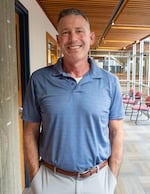Days after Oregon officially recriminalized drug possession, Douglas County Sheriff’s Deputy Ryan Gomez found himself helping with an arrest.
Officers in the town of Sutherlin stopped a car near a park, he recalled. They spotted fentanyl and methamphetamine inside. He and the officers arrested the man for misdemeanor drug possession.
Recriminalization went into effect Sept. 1. Before that date, drugs would have resulted in far less punishment. Officers would have ticketed the man.
“Now, there’s consequences to the actions,” Gomez said. “He has to face the judge and explain his actions.”
It may have been a different story for the man had he been stopped in a county deploying a new state program called “deflection.” It aims to get people criminally charged for possessing small amounts of drugs into treatment, in lieu of going to court.

Douglas County Sheriff's Deputy Ryan Gomez, right, stands outside his cruiser while responding to a call in Glendale, Ore. Gomez is a field training officer and said he has helped arrest people after Oregon's recriminalized drug laws went into effect Sept. 1.
Troy Brynelson / OPB
Lawmakers over the summer offered counties state dollars in exchange for creating their own deflection programs. More than 20 counties applied, submitting plans that involved activities like establishing shelters and pairing police with substance use experts.
For example, a person in Multnomah County who has drugs, but no outstanding warrants, may be deflected away from the justice system. They go to treatment instead. A successful trip could result in the person never facing a criminal charge.
Other counties, like Douglas, didn’t apply at all.
What’s left is a patchwork of drug enforcement policies across the state. The contrasting approaches may look starkest at the border of Douglas and Lane counties. Both counties straddle Interstate 5 and are planning widely different approaches.
Lane County officials tell OPB they are planning a robust deflection program. Douglas County, on the other hand, plans to try policing illicit substances like the old days.
‘By golly, he‘s going to prosecute them.’
In opting out of the state’s deflection program, Douglas County Sheriff John Hanlin is conscious that the county may look severe. He believes jail and the justice system can turn lives around.
To him, Measure 110, the voter-approved decriminalization of drugs in 2020, failed in its aim to improve drug users’ lives. He and his deputies had few means to get people into treatment without criminal charges looming over their heads.

Chelsea Jones and Dawn Hemry, staffers with the organization Adapt Integrated Health Care, stand in a crisis resolution room at Roseburg's sobering center on Sept. 16, 2024. The crisis resolution rooms are offered to people in crisis to stay voluntarily.
Troy Brynelson / OPB
“Don’t get me wrong; I believe treatment is an extremely important component to this drug problem that we’re dealing with,” Hanlin said. “Treatment works, but only if there are consequences that go along with that.”
While every deflection program will be different, criminal charges can still be leveled against a person if they don’t comply.
Hanlin noted that landing in jail for a drunken incident when he was a teenager proved a wakeup call. He also brought up his 31-year-old son’s ongoing addiction, which has led to a lengthy rap sheet of misdemeanors and felonies in Douglas County.
“If he got arrested and spent a day in jail and got out the next, that wasn’t even long enough for him to realize that he’d done anything wrong,” Hanlin said. Jail is “a necessity if you want to wake them up and get them to think, ‘You know what? I think this problem is getting out of hand.’”
Deputies made nine arrests in September under the new recriminalization statutes, according to a sheriff’s department spokesperson.
Overdose deaths have been rising. According to data from the Centers for Disease Control and Prevention, overdose deaths rose from 23 in 2020 to 43 in 2023. That’s less than 4 for every 10,000 people.

Chelsea Jones, of Adapt Integrated Health Care, opens the door to a stimulation room at a sobering center in Roseburg, Ore. on Sept. 16, 2024. The sobering center opened in 2021 and often functions as a holding cell.
Troy Brynelson / OPB
The sheriff, first elected in 2008, said it was a joint decision not to participate between himself, District Attorney Rick Wesenberg and the county’s Board of Commissioners. Wesenberg and the county commissioners did not respond to multiple requests for interviews.
Hanlin said he wanted to take a wait-and-see approach with deflection: Let other counties go first with their experiments. He added that the county worried about using one-time state grant dollars without assurances of ongoing funding.
He doubted empowering his deputies to enforce stricter penalties would lead to unintended consequences, such as crowding the jail.
“Most of these cases are going to be cite and release cases,” he said. “But the DA assures me that, by golly, he’s going to prosecute them.”
A drug user’s fate is then up to the courts, Hanlin said. Douglas County does offer diversion programs and a drug court that aim to soften punishment and help drug users get clean.
“I don’t think we can arrest our way out of the drug addiction problem,” Hanlin said. “But I know that, obviously, doing nothing isn’t going to cause the problem to go away either.”
‘A lot of folks just want to see people get help’
Crossing the county line north into Lane County, one will find a completely different approach. Officials there hope to get more people into treatment and keep them away from jail cells and courtrooms as much as possible.
Oregon gave Lane County $2.1 million to assist. That will help pay for housing, officials said, and for a team of substance use specialists, known as navigators, who work with police and decide if a person should be deflected.

Clint Riley stands at the Lane County Courthouse on Sept. 17, 2024. Riley is leading the county's deflection program that aims to keep low-level drug users out of court.
Troy Brynelson / OPB
Clint Riley, who is leading the program, said he has traveled to the county’s various police agencies to help train them on when to call a navigator.
“That’s a different training that most of us have never been to before,” Riley said. “Maybe five years ago, you would have taken this person to jail. Now, we’re using a different approach. So it’s crucial that the relationship between navigators and law enforcement is good.”
Law enforcement agencies seem to have bought in. Chris Parosa, the Lane County District Attorney, said officers are glad drug laws have more teeth yet they aren’t necessarily being asked to make many more arrests.
“That’s where the opportunity lies for them,” Parosa said. “Instead of having to – prior to ballot Measure 110 – have those people arrested, take them down to jail, fill out probable cause affidavits and immediately begin writing reports because that person is in custody, they can call out a person who is detached from the criminal justice system to take custody and control.”
Lane County is already home to one innovative first-responder program. CAHOOTS launched in the 1970s as one of the first-ever services dispatching mental health specialists through 9-1-1 to help people in crises.
Their deflection plans will effectively turn Riley and the navigator into case managers for low-level drug offenders. Parosa said the navigators will keep informing the county if people are actively pursuing treatment and not skirting responsibility.
“I’m not trained in the realm of substance abuse treatment,” Parosa said. “I’m a criminal attorney. It would be highly inappropriate for me as a criminal attorney to ultimately tell a substance abuse or behavioral health specialist how to do their job or what a person needs.”
Many of the navigators themselves will be ex-addicts, Riley said.
“Some law enforcement in our community might have arrested that navigator 15 years ago, when they were in that situation, and now they’ve completely changed their life,” he said. “They got help, got treatment, and now they’re working as a professional in our community with credentials.”
Lane County saw overdose deaths rise recently, too. From 2020 to 2023, deaths rose from 97 to 212, according to CDC figures. That’s about five-and-a-half deaths per 10,000 people.
The navigator program has not launched yet, according to Riley, but he envisions a system with wide latitude. A person facing criminal charges that aren’t inherently drug related – such as trespassing or theft, for example – may be able to get those charges deflected, too. The victim of a crime would have to agree, too.
“A lot of folks just want to see people get help, if they think it’s going to stop,” Riley said.
He doesn’t criticize counties like Douglas that are not participating in deflection. He acknowledged that many perceive Oregon’s drug decriminalization efforts to have failed. Another experiment can be daunting.
Riley formerly commanded the Lane County Sheriff’s Office jail. He said he saw firsthand that it was treatment, not jail in and of itself, that helped people. He said he helped launch new programs to get people medication and counseling.
“We started seeing people leave the jail in a better space, in a better place,” Riley said. “I’ve seen a lot of people spend a lot of time in jail and prison due to their addiction and, at some point, what stopped their addiction? For most people, they got treatment.”
Hanlin, the Douglas County Sheriff, said they are willing to learn from other counties if their programs succeed.